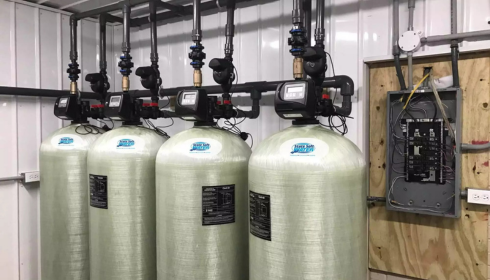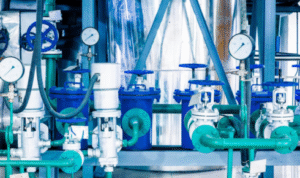Why More Michigan Businesses Are Turning to Commercial Water Softeners

commercial water softener Michigan
There’s something oddly overlooked in the daily rhythm of a business: water. It’s everywhere—running through coffee machines in the break room, feeding boilers, powering dishwashers in restaurants, and keeping operations steady in countless industries. Yet for many companies across Michigan, water isn’t always the silent, reliable partner it should be. Hard water—loaded with minerals like calcium and magnesium—can quietly wreak havoc. And that’s where the quiet heroes of the story step in: commercial water softeners.
I’ve seen plenty of small and large businesses underestimate the importance of water quality. Maybe they chalk up scale buildup in pipes as just “one of those things,” or accept higher energy bills without realizing the culprit is mineral buildup. But more often than not, the fix is much simpler than they imagine. For many, investing in a commercial water softener Michigan businesses can count on isn’t just about clean water—it’s about saving money, equipment, and even reputation.
Hard Water Doesn’t Just Stay in the Pipes
Think about a restaurant kitchen. Every plate, glass, and utensil needs to sparkle. But when hard water gets involved, those dishes can come out looking streaky or spotted no matter how carefully they’re washed. Hotels face the same battle with linens—sheets and towels washed in hard water turn stiff, scratchy, and worn way faster than they should. In manufacturing, the problem can be even more serious, with mineral buildup clogging lines, stressing boilers, or slowing down production equipment.
It’s not dramatic to say that untreated hard water ends up costing businesses thousands. Not just in extra maintenance, but in things like guest satisfaction, energy bills, and equipment life span. That’s why water softening systems are quickly moving from a “maybe someday” idea to a necessity for anyone serious about running a smooth operation.
The Role of Industrial Experts
Not all businesses face the same challenges. A bakery with a single steam oven isn’t dealing with the same scale of issues as a large manufacturing plant running multiple boilers day and night. That’s why it’s important to work with an industrial water softener company that actually understands how varied the needs are.
These companies don’t just drop off a system and disappear. The good ones dig into water testing, system design, and long-term maintenance plans. They know that the water profile in one Michigan city may look totally different from the next. And because businesses run on tight margins, the goal isn’t just to soften the water—it’s to build a solution that reduces costs without overengineering.
It’s a bit like tailoring. You wouldn’t buy a suit off the rack for a wedding and expect it to fit like a glove. Same with water systems. The right provider adjusts to your business, not the other way around.
A Quiet Boost to Reputation
One thing I love about this topic is how unglamorous it seems at first—water softeners don’t make flashy headlines. But they can quietly transform a business’s reputation. A hotel guest might not rave about how “soft” the towels felt, but they sure notice if things feel stiff or dingy. A restaurant customer probably won’t think twice about the sparkle on their wine glass, but if that same glass is cloudy? It leaves an impression.
These little details stack up. Over time, they shape how customers feel about a brand. And the root of those details, more often than people realize, comes back to the water running behind the scenes.
Local Services That Actually Get It
Michigan businesses are fortunate in that they don’t need to look far for experienced providers. Local specialists already understand the quirks of regional water. For example, State Soft Water commercial services have built a reputation for helping businesses across different industries keep their operations running smoothly. Their teams aren’t guessing at what might work—they’ve dealt with it before, whether it’s helping a car wash extend the life of its sprayers or a school cut down on maintenance costs.
Having someone local makes it easier too. You’re not waiting on a national hotline to send out help from three states away. You’re working with people who know the area, can stop by for service, and have an interest in building long-term relationships rather than one-off transactions.
Long-Term Thinking Saves Money
Here’s the part that often clicks for business owners: a water softener isn’t just about comfort or presentation. It’s about efficiency and longevity. Hard water forces heaters and boilers to burn more energy, which inflates utility bills. It reduces the life span of expensive equipment, meaning earlier replacements and more frequent breakdowns. And when you add it all up, the return on investment for a proper commercial system often comes much quicker than expected.
The trick, of course, is looking beyond the upfront cost and seeing the bigger picture. A well-maintained water softener can quietly run for years, keeping operations smooth, energy costs lower, and customers happier without anyone needing to think about it day to day.
Wrapping It All Together
Water is one of those things most of us take for granted until there’s a problem. But for Michigan businesses, ignoring hard water issues isn’t just inconvenient—it’s expensive. Commercial water softeners step in as a quiet but essential tool, protecting equipment, improving customer experiences, and keeping long-term costs in check.
Whether it’s through trusted local providers, specialized industrial expertise, or long-term service plans, the solutions are already out there. The real question is whether a business is ready to see water for what it really is: not just something that flows through the pipes, but a resource that shapes the way they operate every single day.



